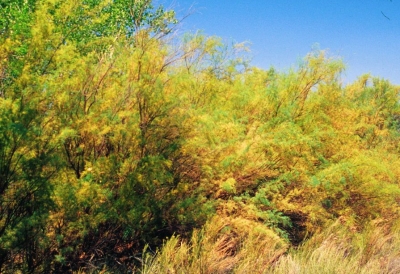Controlling Saltcedar/Tamarix
Saltcedar
It digs deep, sending downs roots as far as 95 feet below the surface. It pulls salt from the soil and water, expels it and makes the ground worthless to all plants and animals except itself. Controlling saltcedar is challenging as it grows strong and tall and it currently covers millions of acres of the western U.S. It’s saltcedar, sometimes called tamarix, and it’s one of the most voracious land grabbing plants on the Colorado Noxious Weed list (List B).
Each individual saltcedar plant produces around 600,000 tiny seeds every year and root runners also create new plants. Once a group of the weeds develops into a stand, growth accelerates and native plants are forced out and usable land diminishes.
weeds develops into a stand, growth accelerates and native plants are forced out and usable land diminishes.
Controlling Saltcedar
Mechanical removal of saltcedar is possible, as long as efforts are timed correctly and are thorough. All mechanical efforts are best attempted before the plant blooms and seeds begin to form so that you truly do hinder, not help, plant reproduction. Because roots can grow very deeply (up to 95 feet below ground level), multi-season digging efforts will definitely be required. One root that is broken off with a shovel may stop the growth of an existing plant, but the remaining root can send out at least a dozen runners for new plants.
Controlling saltcedar through carefully controlled burning of existing plants (again, before seeds are formed) can weaken roots so that the plants you have to remove in subsequent years will require less effort.
Various herbicide application methods may be required – with application to foliage, cut stems or bark. Specific chemical methods depend on location and size of a saltcedar stand, proximity of animals, open water, native plants and/or residential communities. Because repeated applications of herbicide may be required, the ability to follow through with a treatment schedule should be considered.
SprayTech, Colorado weed spraying professionals, can reduce the confusion and stress of treating and controlling saltcedar (tamarix). Call them at 720-248-0000 for more information.


Comments are closed.